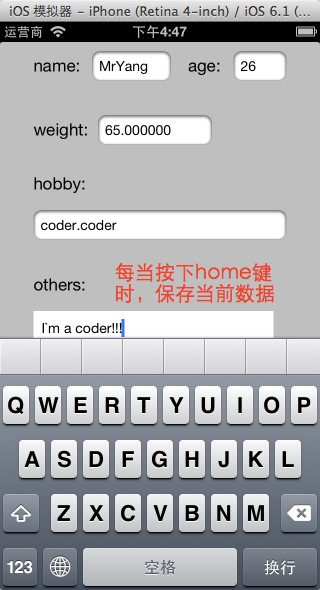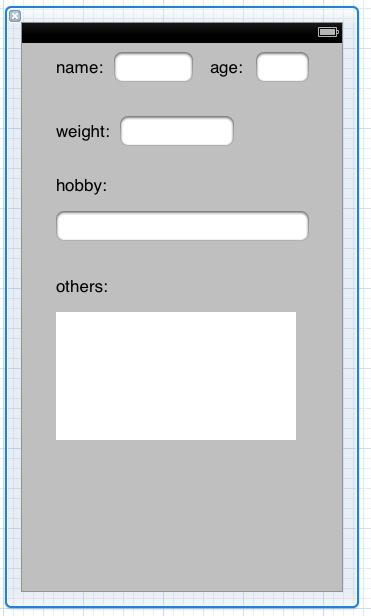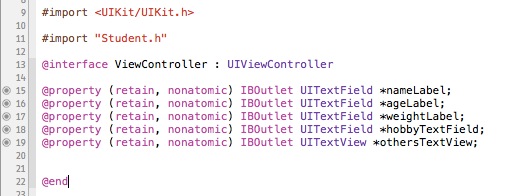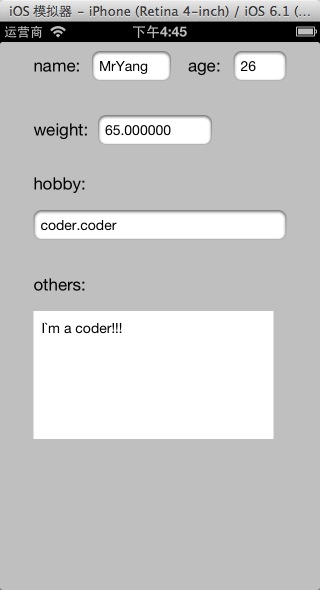NSKeyedArchiver
使用例子:
NSString *str = @"abc";
NSString *astr = @"efg";
NSArray *Array = [NSArray arrayWithObjects:str, astr, nil];
//保存数据
NSString *Path =
[NSSearchPathForDirectoriesInDomains(NSDocumentDirectory,
NSUserDomainMask, YES) objectAtIndex:0];
NSString *filename = [Path stringByAppendingPathComponent:@"test"];
[NSKeyedArchiver archiveRootObject:Array toFile:filename];
str = @"a";
astr = @"";
//加载数据
NSArray *arr = [NSKeyedUnarchiver unarchiveObjectWithFile: filename];
str = [arr objectAtIndex:0];
astr = [arr objectAtIndex:1];
NSLog(@"str:%@",str);
NSLog(@"astr:%@",astr);
---------------以下 是转载其他人的 学习 -----------
今天记录一下学习 NSKeyedArchiver、NSKeyedUnarchiver ,主要用在ios数据存储上,数据从内存存储到闪存上,这个过程称为归档。
一、创建一个数据模型(自定义类)
现在就以大家常见的Student的为例,这个模型有5个参数:name、age、weight、hobby、others
Student.h
- #import <Foundation/Foundation.h>
- @interface Student : NSObject<NSCoding,NSCopying>
- @property(copy,nonatomic) NSString *name;
- @property(assign,nonatomic) int age;
- @property(assign,nonatomic) double weight;
- @property(copy,nonatomic) NSArray *hobby;
- @property(copy,nonatomic) NSDictionary *others;
- @end
Student.m
- #import "Student.h"
- #define knameKey @"name"
- #define kageKey @"age"
- #define kweightKey @"weight"
- #define khobbyKey @"hobby"
- #define kotherKey @"others"
- @implementation Student
- @synthesize name;
- @synthesize age;
- @synthesize weight;
- @synthesize hobby;
- @synthesize others;
- #pragma mark-NSCoding
- -(void)encodeWithCoder:(NSCoder *)aCoder{
- [aCoder encodeObject:name forKey:knameKey];
- [aCoder encodeInt:age forKey:kageKey];
- [aCoder encodeDouble:weight forKey:kweightKey];
- [aCoder encodeObject:hobby forKey:khobbyKey];
- [aCoder encodeObject:others forKey:kotherKey];
- }
- -(id)initWithCoder:(NSCoder *)aDecoder{
- if (self == [super init]) {
- name = [aDecoder decodeObjectForKey:knameKey];
- age = [aDecoder decodeIntForKey:kageKey];
- weight = [aDecoder decodeDoubleForKey:kweightKey];
- hobby = [aDecoder decodeObjectForKey:khobbyKey];
- others = [aDecoder decodeObjectForKey:kotherKey];
- }
- return self;
- }
- #pragma mark-NSCopying
- -(id)copyWithZone:(NSZone *)zone{
- Student *copy = [[[self class] allocWithZone:zone] init];
- copy.name = [self.name copyWithZone:zone];
- copy.age = self.age;
- copy.weight = self.weight;
- copy.hobby = [self.hobby copyWithZone:zone];
- copy.others = [self.others copyWithZone:zone];
- return copy;
- }
- @end
通过以上的代码我们可以看出,要实现对数据模型的归档,需要我们实现NScoding协议,
NScoping(copy协议是为了模型数据可以复制,对于归档而言,不是必须要实现)
NScoding协议需要实现两个方法:
-(void)encodeWithCoder:(NSCoder *)aCoder
以keyValue形式对基本数据类型Encoding
-(id)initWithCoder:(NSCoder *)aDecoder
以keyValue形式对基本数据类型Decoding,返回数据模型本身
-(id)copyWithZone:(NSZone *)zone
NScopying协议的方法,目的为了实现数据模型的copy,如下实例:
- Student *s1 = [[Student alloc] init];
- Student *s2 = [s1 copy];
- NSLog(@"s1:%@",s1);
- NSLog(@"s2:%@",s2);
Log控制台输出:
2013-06-16 16:19:36.157 ArchiveDemo[1357:c07] s1:<Student: 0x8875340>
2013-06-16 16:19:36.158 ArchiveDemo[1357:c07] s2:<Student: 0x8875360>
二、ViewController.xib添加几个针对数据模型的可编辑组件:
三、接下来就是在Viewcontroller.m中的操作,首先添加一个内部使用的方法,返回要保存到闪存的位置:
- -(NSString *) getFilePath{
- NSArray *array = NSSearchPathForDirectoriesInDomains(NSDocumentDirectory,
- NSUserDomainMask, YES);
- return [[array objectAtIndex:0] stringByAppendingPathComponent:kFileName];
- }
在ViewDidLoad方法里,每次viewController初始化时,读取路径下的归档文件,读取数据模型数据。
同时添加一个通知每当按下Home键时,数据及时归档到闪存中。
- - (void)viewDidLoad
- {
- [super viewDidLoad];
- if ([[NSFileManager defaultManager] fileExistsAtPath:[self getFilePath]]) {
- NSLog(@"filePAth:%@",[self getFilePath]);
- NSData *data = [[NSData alloc] initWithContentsOfFile:[self getFilePath]];
- NSKeyedUnarchiver *unarchiver = [[NSKeyedUnarchiver alloc] initForReadingWithData:data];
- //解档出数据模型Student
- Student *mStudent = [unarchiver decodeObjectForKey:kDataKey];
- [unarchiver finishDecoding];//一定不要忘记finishDecoding,否则会报错
- //接档后就可以直接使用了(赋值到相应的组件属性上)
- self.nameLabel.text = mStudent.name;
- self.ageLabel.text = [NSString stringWithFormat:@"%d",mStudent.age];
- self.weightLabel.text = [NSString stringWithFormat:@"%f",mStudent.weight];
- self.hobbyTextField.text = [mStudent.hobby objectAtIndex:0];
- self.othersTextView.text = [mStudent.others objectForKey:@"other"];
- [unarchiver release];
- [data release];
- }
- //添加一个广播,用于注册当用户按下home键时,归档数据到闪存中
- UIApplication *app = [UIApplication sharedApplication];
- [[NSNotificationCenter defaultCenter] addObserver:self selector:
- @selector(saveAppDataWhenApplicationWillResignActive)
- name:UIApplicationWillResignActiveNotification object:app];
- }
四、某一操作需要保存数据的时候,及时归档到闪存中
- /**
- *当用户按下Home键,返回桌面时,归档当前数据到指定文件路径下
- */
- -(void) saveAppDataWhenApplicationWillResignActive:(NSNotification*) notification{
- Student *saveStudent = [[Student alloc] init];
- saveStudent.name = self.nameLabel.text;
- saveStudent.age = [self.ageLabel.text intValue];
- saveStudent.weight = [self.weightLabel.text doubleValue];
- saveStudent.hobby = [NSArray
- arrayWithObjects:self.hobbyTextField.text, nil];
-
- saveStudent.others = [NSDictionary
- dictionaryWithObjectsAndKeys:self.othersTextView.text,@"other",nil];
- NSMutableData *data = [[NSMutableData alloc] init];
- NSKeyedArchiver *archiver = [[NSKeyedArchiver alloc]
- initForWritingWithMutableData:data];
- [archiver encodeObject:saveStudent forKey:kDataKey];
- [archiver finishEncoding];
- [data writeToFile:[self getFilePath] atomically:YES];
- [data release];
- [archiver release];
- [saveStudent release];
- }
运行效果:

归档这种保存方式缺点就是没有属性列表(NSuserDefault)速度快,
因为它每次都要把文件保存到闪存中,
优点是可以创建自己想要的数据模型,然后统一以模型方式存储,
比属性列表要过分依赖Key要省心。

























 3336
3336

 被折叠的 条评论
为什么被折叠?
被折叠的 条评论
为什么被折叠?








